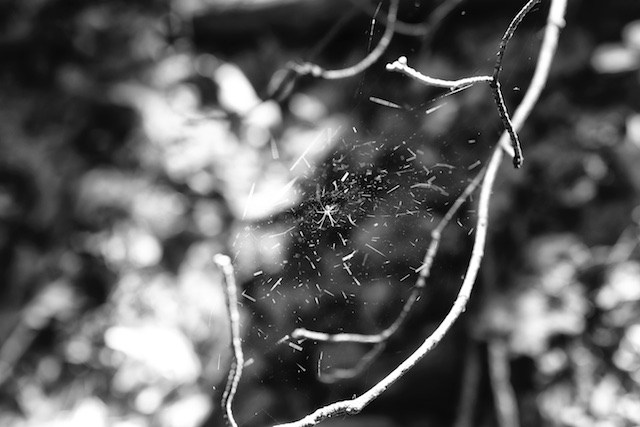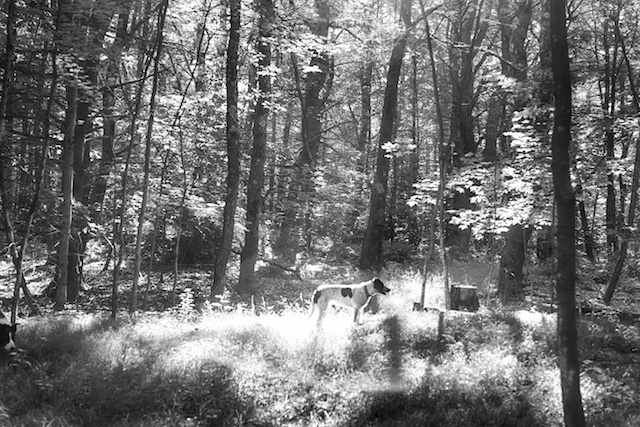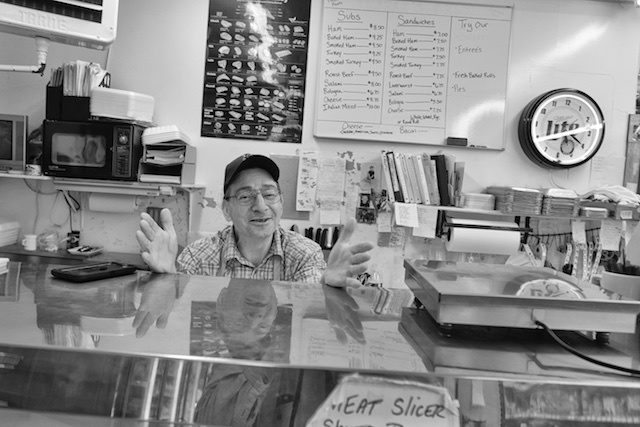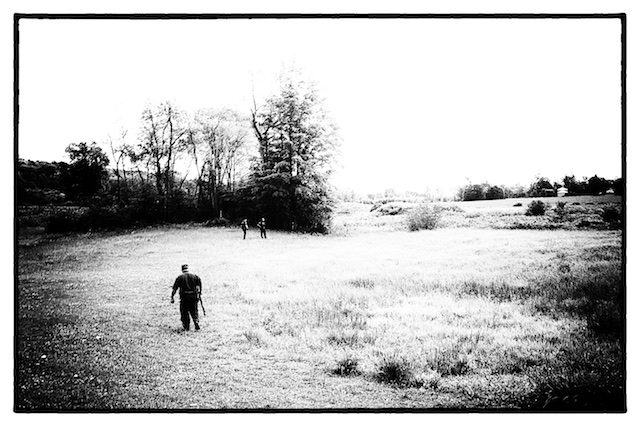
In the woods, a spider web catching the morning sun. There were countless webs reflected in the morning light, all over the forest floor, and in this web, the spider sat patiently, his thread catching the sun slicing through the dark forest.

I used my new Giffen yellow filter for the first time with the monochrome camera out in the woods, and I was rewarded with this lovely refraction of sunlight, and a sharper contrast between the light and the dark. Filters affect contrast in different ways, some subtle, some sharp. I have to get to know them.

Denny Yushak is like a maestro, he stands behind the deli counter at Yushak’s Deli and grocery store in the small village of Shushan, N.Y. He knows almost every customer by name, and has a wry smile, easy manner and accepting way of looking at the world. If you even mention his granddaughter, he will come out from behind the counter and show you a dozen photographs of her, most of them with her walking around the store.
He will also, without being pressed, show photos of the big fish he has caught. He knows when to smile and how to nod solemnly, as if what he has heard is the wisest thing ever uttered. All the while, his hands are busy cutting, chopping and wrapping. It is all seamless, the chatter and conversation, the preparation of food.
People come to Yushak’s from many miles to get his meats, sausages and steaks. His meats are considered the best around for a hundred miles. I get all of my meat there now when I shop, in part because its good, and in part because it is one of the best places in the world to see the impact of a small local business on a town.
Yushak’s is the soul of Shusan, and Denny and his wife Debbie are the souls of Yushak’s.
I went there yesterday to buy his sweet turkey sausage, some four-bean salad and enough chopped sirloin for dinner. His reputation is well deserved.
But his connection to the people in the town and his customers are what is striking. He knows how to listen, he knows how to laugh, no matter what people are buying, they come over to the counter to say hello. He doesn’t seem to ever know a thing, and his eyes remind me of a wise priest or rabbi who has seen it all and carries much wisdom in his head. I thought this photo nailed him right down.

If you live on a farm, you learn quickly that life and death are not two separate things, as so many people would love to believe, but one thing, different parts of the same thing.
In my 15 years here, we have lost chickens, roosters, donkeys, sheep, dogs, lambs, seen countless raccoons, barn swallows, rabbits, skunks, deer and groundhogs die.
I have had to shoot a number of them for various reasons, my rifle is important to me.
Last night, state environmental police and sheriff’s deputies came to shoot a grievously wounded bear that was hit by a truck in front of the farmhouse and managed to crawl over our fence and into the marsh in our pasture, where he collapsed, dragging his broken legs. It was awful watching him limp and cry out and crawl across the field.
It was as merciful a killing as I have known. For Maria and I, it was somber and sad.
Out on the road, a few hundred yards from the killing, people who called themselves supporters of animal rights – they were passing by just after the accident occurred – sat in a car with their young children shouting at us and the police to save the bear, there was no reason, they insisted, for us to kill it.
They came to save the bear from us.
The children’s shouts of anger and protest echoed across the pasture along with the two shots fired from a shotgun to kill the bear.
It was an eerie scene, a symbol of profound disconnection between people who know animals only as pets and people who know animals.
The death of the bear was more somber for me than most of the other deaths I have witnessed. For Maria, also, the bear is a symbol of nature that we respect.
Bears are wild animals, not pets or livestock, they are, for the most part, gentle and private creatures, afraid of people and their foolishness, they live in dens out in the woods and disappear for most of the winter. Some of them become pests and ravage bird feeders and garden sheds and chicken coops, but they flee from humans as a rule, and are not often seen, and usually run off by shouts or noise.
The police said there is a 400 pound bear rampaging through the gardens and back yards of nearby Cambridge, the environmental police are looking to find him, tranquilize him and move him away from the town. Our bear was shattered when a huge pick-up hit him head on. We heard the thump, it was loud and chilling, even from a distance, it is hard to imagine that he survived it at all.
In Native American cultures, bears are known as the Great Mothers, for the loving care they bestow on their cubs.
By and large, they have vanished from most urban areas. Even in the country, we have not figured out how to live with them. A number of them are killed in accidents, hunted for sport, considered pests and scavengers.
Our bear, a male about three years old, was a beautiful animal with a thick and clean and shiny coat and enormous paws. We found a well-traveled He was crossing the marshes on a path bears and deers use to get to the woods across the road. Bears travel widely.
Our friend Ed Gulley is a kind of Daniel Boone to us, he thought nothing of taking the bear, skinning it and tanning the hide. We were lucky to have him here.
The family shouting from their car and intruding on our privacy and sadness were a potent symbol for me of the way in which the animal rights movement and so many Americans have lost any real understanding of animals, what they need, and the way they live.
I have seen again and again, in place after place, farm after farm, this troubling reality: the people who presume to love animals and speak for their rights are utterly ignorant of animals and their needs, and they seem to often use them to promote the hatred of people, even those who really do love know animals and understand them.
Just as the protesters in New York City could not accept that the New York carriage horses were not suffering abuse by pulling light carriages, or that it is not torture for ponies to give rides to children, or that not every elephant in a circus was unhappy or abused, the family in the car could not accept that animals are our partners in the world, not our dependent children. And life sometimes happens to them as well as to us.
No living thing on earth gets a perfect life, not me, not horses or bears or dogs.
The only way in which animals like draft horses and bears can remain in our world is for us to take the trouble to know and understand the true nature of their lives. Work is good for working horses. Three hundred pound bears can’t be taken to the local animal hospital, nor can they ever be left to suffer and die on strange land. For one thing, they are suffering terribly after accidents with motorized vehicles. For another, wounded animals can be dangerous to handle or approach, both to people and other animals.
The deputies and police approaching the bear to see his condition were taking a serious risk, they were on a mission of mercy, not cruelty.
There are very few places in our country where large wounded bears can be airlifted – as if that were possible – or transported to medical facilities that might save them. And few wounded animals would survive such a journey, they are vulnerable to shock and trauma.
Can bears and humans co-exist at all, as habits vanish and humans lose touch with the natural world?
Many visitors to parks and rural areas feed bears, leave food behind at campgrounds, offer it to the bears directly. Then they are blamed for being pests. Homeowners leave feeders hanging low and trash in easily opened containers, then wonder why bears come into their backyards and wreck their feeders and cans.
The public, 90 per cent of whom live in urban and suburban areas of America, no longer have any understanding of what a bear is, how it lives, how we might live with it. Nor do animal rights activists in New York understand that the carriage horses there are among the luckiest and best cared for horses on the earth.
Well meaning animal lovers have driven the big Asian elephants from the circus, not knowing or seeming to care that these animals have worked with people for thousands of years, or that some were much loved and well treated by trainers who devoted their lives to them, or that almost all of the elephants will face slaughter or radical confinement because there is nowhere for them to go and nothing for them to do now.
Most Americans no longer know that working animals love to work and need to work.
Maria and I felt a gravity this morning, a somber feeling.
We were happy that our friend Ed Gulley was here to honor our dead bear by taking him home, saving his hide, using his meat for nourishment. At least he wasn’t hauled off to a dump.
If Ed had not been here, I think Maria and I would have arranged to dump the body way out in the woods, where he could at least have fed the animals. We had no idea how we might have got him there. And we shuddered to think what might have happened if our wounded bear had slipped over our fence and into our pasture unseen. This is where the animals often graze.
We rarely see bears, but we are aware of them, out in the woods where we walk. We see their scat, their claw marks on trees, we hear their owl-like hoots to one another, sometimes we get glimpse of them moving quickly and far away.
Last night, I was not feeling empathy or compassion for the family sitting in their SUV, engine running, staring and shouting at us and the police.
I wanted to go out to the SUV idling intrusively on the road by our fence and drag the parents out of the car, and ask them what on earth they were thinking bringing their children to see this, encouraging them to mistrust the people who were doing the difficult and painful work of cleaning up the fearsome damage humans do to animals every day. Teaching them to make ignorant judgements or assumptions without caring about the truth.
I wanted to ask them why they were teaching their children to hate people in the name of loving animals, rather than teach them what animals are really like, or to consider ways in which we might learn to live in a better way with them, before it is too late and they are gone for good.
I wanted to ask them why they were teaching their children to hate us and the good police officers crawling through the marsh for hours to find the bear and see what his condition was and then end his suffering. One of the officers was near tears at the idea of killing the handsome bear, still, for all of its troubles, a symbol of the wild.
So I think that is my eulogy to this bear, who I did not know or love, except as an idea or a symbol. I wonder if we can ever learn to understand animals in a new way and learn to live with them, rather than just kill them and misunderstand them. Or if it is already too late.
So this, I think, is a eulogy: go in peace bear, wherever bears go, I wish your innocent and peaceful spirit safe travels. I hope the wind and the angels take you to a deep and rich forest where there are no people to run you down in trucks or sit in their cars and pretend that they love you.